Page 104 of 352 pages « First < 102 103 104 105 106 > Last »
List of donors and subscribers
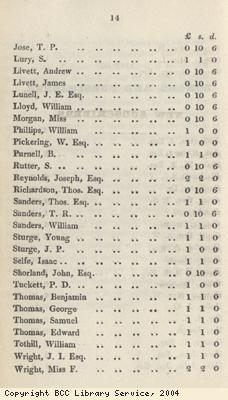
Description:
Extract from Tracts on Slavery, The Foreign Slave Trade , 1837. List of donors and subscribers to the Bristol Auxiliary Anti-Slavery Society.
Date: 1837
Copyright: Copyright BCC Library Service
List of donors and subscribers

Description:
Extract from Tracts on Slavery, The Foreign Slave Trade , 1837. List of donors and subscribers to the Bristol Auxiliary Anti-Slavery Society.
Date: 1837
Copyright: Copyright BCC Library Service
Sepia Print of the Great House

Description:
Sepia Print of the Great House.
The Society of Merchant Venturers is a Bristol-based organisation, which was formed in 1552 as an elite body of merchants involved in overseas trade. The Society still exists today.
Date: unknown
Copyright: Copyright The Society of Merchant Venturers
Sepia Print of the Great House

Description:
Sepia Print of the Great House.
The Society of Merchant Venturers is a Bristol-based organisation, which was formed in 1552 as an elite body of merchants involved in overseas trade. The Society still exists today.
Date: unknown
Copyright: Copyright The Society of Merchant Venturers
Sepia Print of the Great House
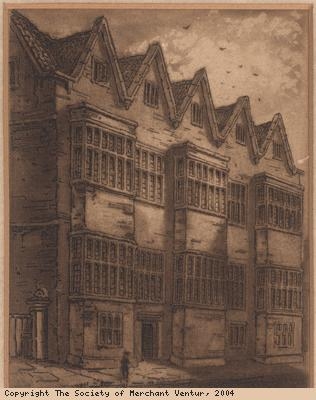
Description:
Sepia Print of the Great House.
The Society of Merchant Venturers is a Bristol-based organisation, which was formed in 1552 as an elite body of merchants involved in overseas trade. The Society still exists today.
Date: unknown
Copyright: Copyright The Society of Merchant Venturers
Poem called The Negroes Complaint
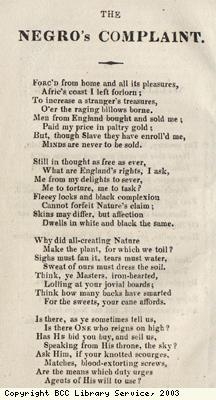
Description:
Extract from Tracts on Slavery, The Foreign Slave Trade , 1837. A poem called The Negroes Complaint by Cowper. An anti-slavery poem published during the proceedings of an anti-slavery meeting held in Bristol, 1826.
The language used to describe people of African descent in the 18th, 19th and 20th centuries is unacceptable in today’s terms. We cannot avoid using this language in its original context. To change the words would impose 20th century attitudes on history.
Date: 1800s
Copyright: Copyright BCC Library Service
Sepia Print of the Great House

Description:
Sepia Print of the Great House.
The Society of Merchant Venturers is a Bristol-based organisation, which was formed in 1552 as an elite body of merchants involved in overseas trade. The Society still exists today.
Date: unknown
Copyright: Copyright The Society of Merchant Venturers
Crushing equipment, Nevis
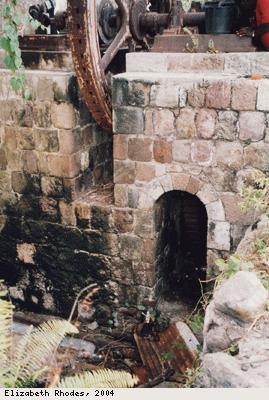
Description:
New River Plantation, crushing equipment.
The tall stems of the sugar cane, had to be crushed to make the juices run out. Crushers were powered by the wind, horses or oxen and latterly by steam.
Mountravers , on the island of Nevis in the Caribbean, was one of the plantations belonging to the Pinney family. John Pinney came to live in Bristol in 1783.
Date: 2001
Copyright: Elizabeth Rhodes
Extract
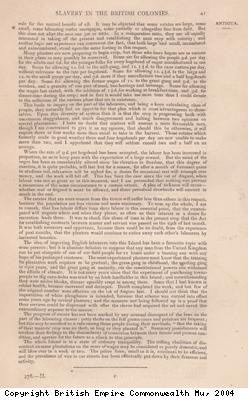
Description:
Extract from letter by Superintendant of Police to Governor of Antigua, regarding the need for uniform wages rates for free labour and the problems of the indentured white servants (Europeans who sold their labour for a set period of time to work on the plantations).From Papers Relative to Abolition of Slavery in the British Colonies, Part II, 1833-35.
Date: 1833-35
Copyright: Copyright British Empire Commonwealth Mu
Pamphlet; apprenticeship in colonies
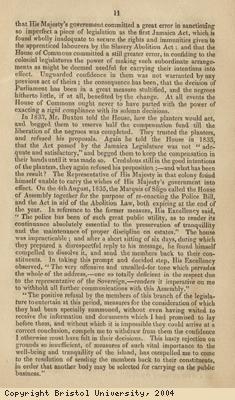
Description:
Pamphlet on Negro Apprenticeship in the Colonies – A Review of the Report of the Select Committee of the House of Commons. The committe was apointed to enquire into The working of the apprenticeship system… Published London 1837.
The committee found that local legislation had been passed which disadvantaged freed slaves.
The language used to describe people of African descent in the 18th, 19th and 20th centuries is unacceptable in today’s terms. We cannot avoid using this language in its original context. To change the words would impose 20th century attitudes on history.
Date: 1837
Copyright: Copyright Bristol University
Page 104 of 352 pages « First < 102 103 104 105 106 > Last »

